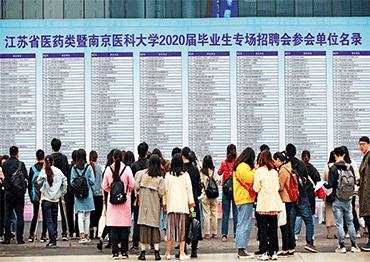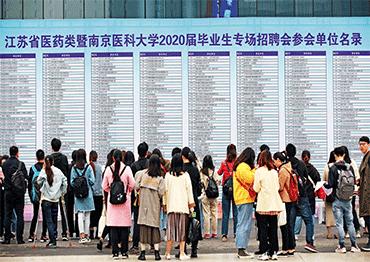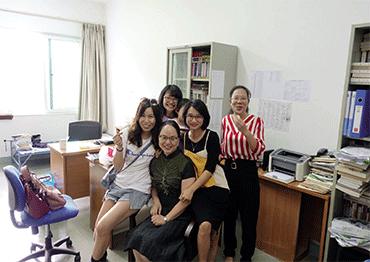Students from China’s second-tier universities recently garnered attention after a book about their lives was published in August. In My Second-tier School Students (Wo de Erben Xuesheng), author Huang Deng, a professor who left her 14-year tenure at a second-tier university in Guangzhou, South China’s Guangdong Province in 2019, explores the struggles and stories of students from less prestigious universities that are often overlooked.
With lower entrance exam and transcript requirements, second-tier universities absorb the millions of students passed over by China’s most prestigious schools. Compared to brand-name schools, these institutions are mostly provincial-level colleges and have limited resources. However, they serve the majority of college students. For Statistics from the Education Examinations Authority of Guangdong Province show that in 2017, first-tier universities in Guangdong enrolled 84,000 students at an average acceptance rate of 11 percent, while second-tier universities enrolled 207,000 at a 27 percent acceptance rate. However, compared to their peers from first-tier colleges, particularly those included as Project 211 and Project 985 schools (government-initiated projects aimed at strengthening higher education), issues involving students from second-tier schools generally receive less attention from the public.
Huang first took notice of this group in 2005 after taking a teaching position at the university, which she does not identify in her book. She was particularly impressed by a student’s essay describing her poverty and hardship. Before that, Huang’s impression of Guangdong was of an open and prosperous province with plenty of opportunities. Over the past 14 years, Huang has taught more than 4,500 students. Nearly half of them came from impoverished areas in Guangdong. “They are mostly from unknown villages and townships. Their biggest ambition is to land a job. After graduation, they mostly take the most ordinary jobs,” Huang said. Their outlooks and situations, Huang believes, more closely represent the majority of young people dealing with the country’s rapid changes over the past 20 years.
Huang graduated with a bachelor’s degree from a modest second-tier university in Hunan Province before earning her master’s and doctorate at more reputed schools. Huang has taught students born in the 1980s and 1990s (known as the post-80s and post-90s generations in China), giving her a unique perspective on their differences.
While teaching post-80s students, Huang said she felt more able to provide them with guidance and discuss topics such as the meaning of life, the value of going to college and their parents’ expectations. Most were receptive and would apply her lessons, she said. But after becoming a class adviser for post-90s students in 2016, she felt that her advice was usually met with indifference.
Compared to their predecessors, Huang found that post-90s students are generally more unsure about their futures. Every graduation season, students consulted with her about their chances of getting into a master’s degree program, becoming civil servants or starting a business. Inevitably, they would ask: “What’s the point of going to college after all?”
Post-90s students are more concerned about buying a home. And with good reason: Real estate prices in Guangzhou have risen several times over the last decade. About one-third of Huang’s post-80s students managed to stay in Guangzhou and Shenzhen after graduating. That has changed for her post-90s students, especially those originally from outside Guangzhou. Few were confident they could stay in the city after graduation or buy an apartment on their own.
These feelings correspond with a recent online phenomenon: Sang culture. Meaning “dejected” or “frustrated” in Chinese, Sang is a form of dark humor rife with self-deprecation and mockery. Through expressing an unwillingness to succeed, it reflects the futility of pursuing traditional paths to success as younger people feel the odds are increasingly stacked against them. It is sarcastic defeatism.
There are also students who tried to start their own businesses. Yao Dashun, Huang’s former student from the class of 2014, started a bike-share company. Compared to other startups, Yao operated without the high-profile recognition or relationships that attending an elite university could provide. He withdrew from the project over disagreements with investors. Yao then started an app-based errand-running service on campus, but it did not turn a profit. He eventually returned to his hometown and opened an educational and training institution. Talking with students at his alma mater, Yao found that fewer were planning to go into business after graduation. He said this was not only because the market for internet-based businesses was saturated, but that students were taking a more sober look at their individual prospects.
Increasingly, post-90s graduates from Huang’s school are looking to continue their education at prestigious schools to bolster their resumes. Between 2004 and 2018, the number of enrolled master’s degree candidates surged from 270,000 to 760,000, according to data from the National Bureau of Statistics.
Yan Fangkun, who enrolled at Huang’s school in 2014 and now studies at Northeast China’s Liaoning University, said she failed to find a satisfactory job after graduation, partly due to her degree from an unknown school. She sat the postgraduate entrance exams twice before landing a spot at Liaoning University. Yan said her classmates are at a loss about their futures. “I plan to be a teacher. This goal makes me feel more assured right now. But after going to work I’ll still wonder when I will be able to make real money,” Yan said.
According to a 2019 study from MyCOS Institute, an education research company, graduates of the class of 2014 who went on to get a master’s degree now earn 725 yuan (US$108) more per month than those who went to work straight after graduation.
Huang said that today’s students have different expectations to those during her days in college in the early 1990s. “Our degrees were rather cost-effective and valuable, and jobs were not a problem at all as the economy had just taken off,” Huang said.
College graduates were scarce and highly valued on the market. Though Huang went to a junior college, she felt proud walking down the street as a college student. In 1992, 3.03 million people vied for 750,000 spots. In 2018, 9.75 million tested for 7.91 million spots, a more than 10-fold increase on 1992.
China started to expand its higher education system in 1999 with an action plan targeting education for the 21st century. Enrollment expanded rapidly between 1999 and 2001. In 2001, the Ministry of Education lifted age and marital status restrictions for national college entrance exam takers.
The following year, enrollment rates reached 15 percent, a threshold that according to Martin Trow, an American sociologist of higher education, meant that higher education in China had transitioned from an elite to a public institution. At the same time, competition on the job market increased.
After becoming a teacher, Huang said she feels that today’s college students have it much tougher. Not only do they need to plan their careers the day they set foot in school, but also test for an array of additional certifications to stand out on the job market. “[I] didn’t need to worry about getting a job because the government would take care of it. There were no worries about living costs either, as we had stipends every month. Nor was there a need to fight for a scholarship or other certificates to polish our resumes.”
After graduation, Huang was allocated a job at a dye plant in Hunan Province. Factory employees received free medical treatment and near-free nursery school for their kids. Married workers were eligible for free housing.
In 2005, Huang went to her 10-year college reunion. Among the 36 that showed up, Huang said most worked government jobs or at State-owned enterprises. Many were key employees and had high social and economic status.
While in college, Huang said she was aware of the differences between students at her school and those at elite universities. One of her best friends studied at Beijing’s Peking University, which is widely considered China’s top school. “She said that one of her classmates finished reading a set of theoretical books in high school. I didn’t finish even after my doctoral program,” Huang said. Compared to her school, Peking University has more academic options and campus activities. Her friend would talk about meeting famous people like wuxia author Jin Yong, something that Huang never imagined happening at her school.
When Huang graduated in 1995, the government enacted Project 211 to strengthen about 100 universities and key disciplinary areas. Included schools saw more financial support and personnel. Four years later, Project 985 aimed to further develop 34 top universities, including Peking University and Tsinghua University, into world-class schools.
As a result, the gaps in resources between universities grew larger. Few realized at the time that many years later, college graduates would face very different job prospects based on whether they were from project 211 or 985 schools. For students from second-tier universities, the disparity was more apparent.
Wang Guowei, Huang’s former student and a corrections officer in Sihui, a small city in Guangdong Province, said he felt these differences while he was a student and after graduating. He recalled that in 2008, Guangzhou recruited college students to run in the city’s torch relay ahead of the Olympic Games in Beijing. Students from famous schools like Zhongshan University and Jinan University participated. Students from his school were excluded.
After failing to find a good job in Guangzhou, Wang returned home and took a position at a credit union. Many graduates from his school, which specializes in finance, end up at credit unions. Those who apply to major banks struggle to compete with graduates from project 211 and 985 universities.
Many companies only consider graduates from these schools. In 2012, Zhang Bigong, then president of Shenzhen University, protested a bank’s exclusion of graduates from non-Project 211 universities from its recruitment by withdrawing his school’s funds from the bank. In 2013, a notice published by the Ministry of Education on the employment of college graduates prohibited such discriminatory practices from recruitment.
After working at the credit union for a year, Wang sat the civil service exam. He chose to pursue a career in officialdom because he felt it was the only exam that would not discriminate against his educational background.
Among the class of 2016, the average monthly salary of provincial college degree holders six months after graduation was 990 yuan (US$148) less than those of graduates from universities under the Double First-Class Program. Initiated by the Chinese government in 2017, the program is an extension of projects 985 and 211 that aims to develop world-class universities and disciplines. Three years after graduation, that wage gap grew to 1,915 yuan (US$286).
Wang planned to attend his 10-year class reunion, but the campus was closed due to the coronavirus pandemic. He estimated that only half of his classmates would be content with their lives after graduation.
Huang now teaches at a vocational college in Shenzhen, where she expects to learn more about young people learning to survive in a fast-changing world.

 Old Version
Old Version

